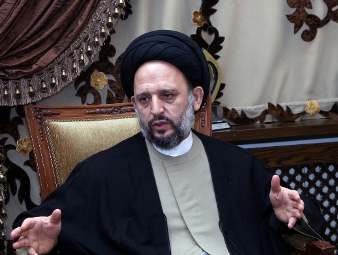
RNA – “It is ironic that the Israelis are afraid of the stones thrown at them by the Palestinians but are not afraid of the Arab regimes who are still asleep and negligent of what this regime is doing in Jerusalem. In the shadow of this humiliating silence, they are implementing their colonial projects in Jerusalem,” said Hujjat al-Islam Sayyid Ali Fadhlullah.
Speaking to a gathering of Lebanese Hajj pilgrims in Makkah, the Lebanese scholar stated that there is no path except through Islamic unity to liberate Jerusalem from the clutches of the Zionist occupiers and added that this cannot be realized until Muslims believe in unity with their hearts.
The Lebanese cleric also criticized Arab and Islamic countries over their silence in the face of the Zionist regime’s crimes against Islam’s third-holiest site, the al-Aqsa Mosque.
Hujjat al-Islam Fadhlullah explained that the Zionist usurpers seek to cut off the Palestinian relationship to the al-Aqsa Mosque, arguing: “If Israel decides to continue its actions in Jerusalem, it will face a new intifada.
In the process of an intifada, they will stop their crimes, but if Arab countries don’t react, Israel will have peace of mind to continue its operations to Judaize the al-Aqsa Mosque.”
His Eminence said that the increased interference of Western countries in regional issues only deepens the existing crises and conflicts and have added to the further tragedies and tension, especially in Syria, Iraq and Yemen.
Arab countries should rely on their own power to solve their domestic problems and not have hope in the help of foreigners.
Speaking to a gathering of pilgrims in Makkah, he stressing that they should seize the opportunity of this spiritual pilgrimage to expand their horizons and strengthen their links with others and openness to everyone.
Hujjat al-Islam Fadhlullah also met with several Shi’ite religious and political personalities in Makkah and called for discussion over the issues in the Islamic world and ways to unite Muslims at a time when almost the entire Arab and Islamic world is choked in political and sectarian crises.
111/112